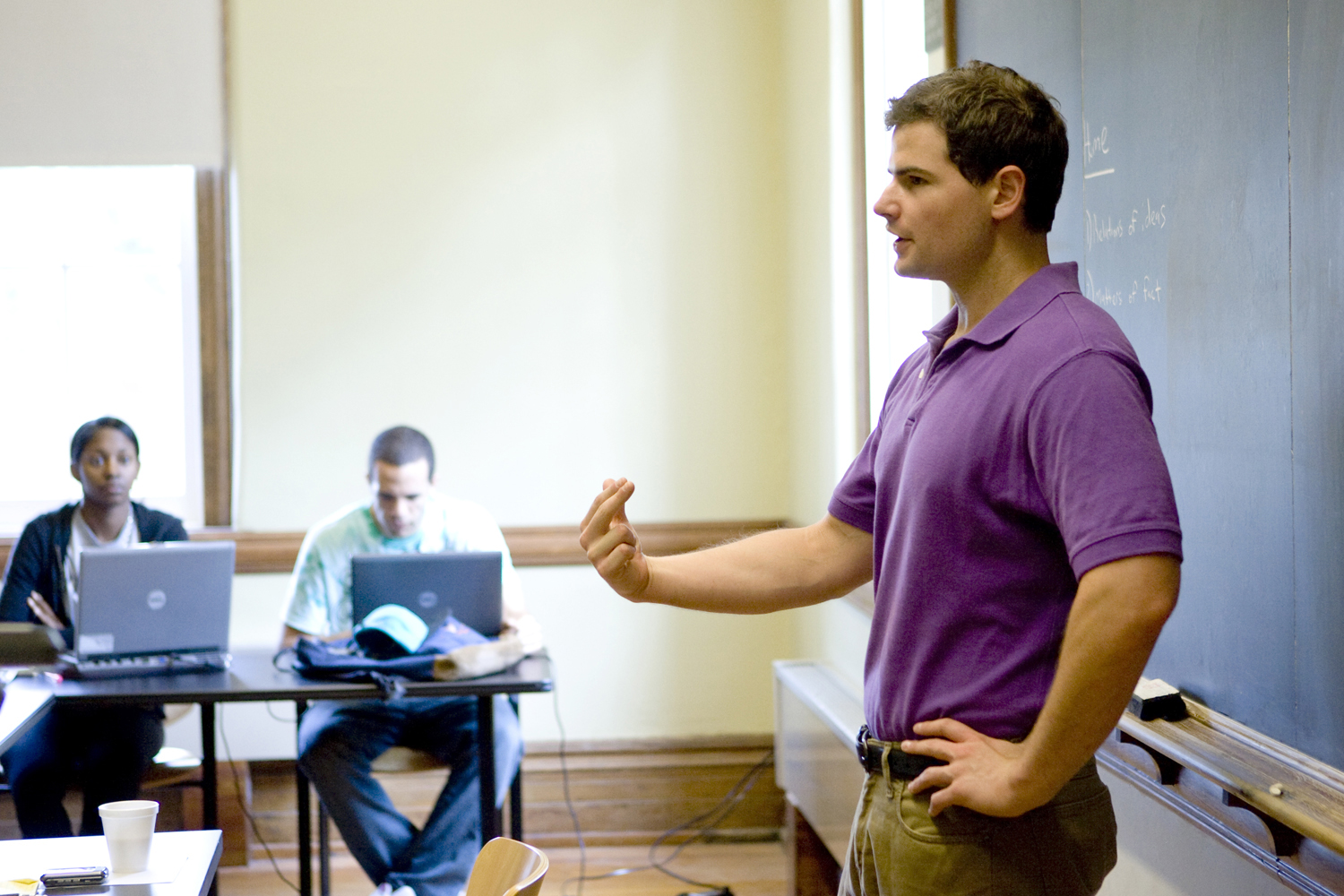Nicholson, a doctoral student in philosophy at the University of Virginia's Graduate School of Arts & Sciences, teaches the summer session philosophy course “Why Be Moral?” to get his students to think deeper into their lives and their behavior.
What constitutes the Good Life depends on one’s philosophical viewpoint, Nicholson noted. An Epicurean would say having more pleasure than pain would be a good life, while an Aristotelian would say a good life would be one of virtue, seeking to perfect human nature.
Nicholson’s students read Aristotle and Epicurus and compare their work to more modern philosophers such as Immanuel Kant, John Stuart Mill and Friedrich Nietzsche. He also assigns Fyodor Dostoevsky’s “Notes from the Underground,” a short novel that shows man’s self-destructive behavior.
“It is a portrayal of someone who knows they are acting contrary to reason, but they see a certain dignity in acting this way,” Nicholson said. “I want the students to see how these questions matter. I want them to understand different assumptions.”
Examining the underlying assumptions is necessary to understanding.
“When people have disagreements about morals, it is often driven by disagreements about something else, such as human nature, the nature of happiness or of freedom,” he said. “People can have strongly held positions, but they don’t think about how they all hang together.”
The course is for nonphilosophy majors and Nicholson needs to be able to explain the concept and texts to people who do not have a common language in the topic.
“You have to find a point of entry to the text, so the students will understand it,” he said, “You need to be able to explain it in plain language, in terms of their own experiences and with concepts with which they are already familiar.”
This summer, the course has attracted many incoming first-year students and others who are filling in electives. He said many of the students are being exposed to these ideas and questions for the first time and, while different students respond differently to them, he said many students have approached him after class and asked for additional readings to help sort out the ideas. These, he said, are the moments that are the most gratifying to him as a teacher.
“I enjoy teaching more than any other part of the job,” he said.
Martha Martell, 20, of Lexington, a rising third-year anthropology student, enjoys the class discussions.
“I’ve always been interested in philosophy and how to view the world,” she said.
Martell and Michael Jones, 21, of Staunton, a rising fourth-year history major, both enjoy seeing how philosophers frame their discussions.
“It is interesting to read the philosophers and see how they structure their arguments,” Jones said. “That will help me in my own writing. There are a lot of different perspectives to history.”
Both Jones and Martell said they are turning the philosophical arguments over in their heads to see how they affect their own views.
“I can use some of my ideas of viewing the world to explain their thoughts,” Martell said of the philosophers.
Nicholson, who received an undergraduate degree in philosophy and the classics from Hillsdale College in Michigan, was unsure in what he wanted to major when he started school. He gravitated toward Greek and Latin, thinking he wanted to major in classics, but once he discovered philosophy, he had found his niche.
“I got hooked,” he said. “And this is something that once you get interested, you get sucked in.”
Nicholson received a graduate degree in philosophy from Western Michigan University in Kalamazoo, and has completed his Ph.D. work at U.Va. with the exception of defending his dissertation.
For himself, Nicholson is attracted to Aristotle’s view that ethics must begin with a consideration of the human good and under what conditions humans flourish.
“The task of being moral, ideally, shouldn’t be odious or burdensome, but should enable people to be happy and to flourish,” he said. “People should be virtuous and enjoy being virtuous, but that is very difficult.
“People are generally bad at doing things that contribute to their happiness,” he said “Being aware of this does not make them immune from self-deception and bad decision making.”
Media Contact
Article Information
July 30, 2010
/content/university-virginia-class-weighs-value-virtue

